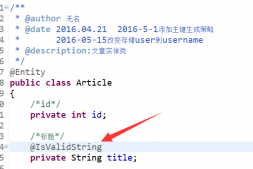本文实例讲述了java实现大文件的切割与合并操作。分享给大家供大家参考,具体如下:
这里实现对大文件的切割与合并。
按指定个数切(如把一个文件切成10份)或按指定大小切(如每份最大不超过10m),这两种方式都可以。
在这里我只是给大家写下我自己的一点简单的代码:
|
1
2
3
4
5
6
7
8
9
10
11
12
13
14
15
16
17
18
19
20
21
22
23
24
25
26
27
28
29
30
31
32
33
34
35
36
37
38
39
40
41
42
43
44
45
46
47
48
49
50
51
52
53
54
55
56
57
58
59
60
61
62
63
64
65
66
67
68
69
70
71
72
73
74
75
76
77
78
79
80
81
82
83
84
85
86
87
88
89
90
91
92
93
94
95
96
97
|
package io2;import java.io.file;import java.io.fileinputstream;import java.io.filenotfoundexception;import java.io.fileoutputstream;import java.io.ioexception;import java.io.sequenceinputstream;import java.util.arraylist;import java.util.collections;import java.util.enumeration;import javax.swing.jfilechooser;public class filesplitdemo {/*** 实现对大文件的切割与合并。 按指定个数切(如把一个文件切成10份)或按指定大小切(如每份最大不超过10m),这两种方式都可以。*/public static void main(string[] args) {jfilechooser jfc = new jfilechooser();// swing中的选择文件// 选择文件int result = jfc.showopendialog(null);// 显示框架用于选择文件file file = null;// 要切割的文件file dest = null;// 目的地文件try {if (result == jfilechooser.approve_option) {// 选中文件// 切割文件file = jfc.getselectedfile();// 用户选择的文件dest = new file(file.getparent(), "splifile");cutingfile(file, dest);// 切割方法// 2合并(运行时,直接对刚才切割的那些文件碎片进行合并)string filename = file.getname();mergedemo(dest, filename);// 合并文件}} catch (ioexception e) {// todo auto-generated catch blocke.printstacktrace();}}private static void mergedemo(file dest, string filename)throws ioexception {// 健壮性防护(用file对象去开道)if (!dest.exists()) {throw new runtimeexception("文件不存在");}// 用一个文件数组将里面的文件都装起来file parth[] = dest.listfiles();// 返回一个抽象路径名数组,这些路径名表示此抽象路径名表示的目录中的文件。if (parth.length == 0) {throw new runtimeexception("碎片不存在");}// y用序列流来合并arraylist<fileinputstream> list = new arraylist<fileinputstream>();// for (int i = 0; i < parth.length; i++) {// list.add(new fileinputstream(parth[i]));//不能这样,这样合并出来的文件是顺序乱的// }for (int i = 0; i < parth.length; i++) {list.add(new fileinputstream(new file(dest, filename + (i + 1)+ "part")));// 套接技术,文件加的顺序要和原文件一样}// 枚举对象接口enumeration<fileinputstream> en = collections.enumeration(list);sequenceinputstream sq = new sequenceinputstream(en);// 写入到新文件中fileoutputstream fou = new fileoutputstream(new file(dest, filename));byte buf[] = new byte[1024];sq.read(buf);int len = 0;while ((len = sq.read(buf)) > 0) {fou.write(buf, 0, len);}fou.close();sq.close();}private static void cutingfile(file source, file dest) {// 切割try {fileinputstream fis = new fileinputstream(source);if (!dest.exists()) {// 文件操作io流要判断文件是否存在。dest.mkdir();}byte buf[] = new byte[1024 * 1024];// 1mfis.read(buf);int len = 0;int cout = 1;while ((len = fis.read(buf)) != -1) {// 用out流来切割文件fileoutputstream fout = new fileoutputstream(new file(dest,source.getname() + (cout++) + "part"));fout.write(buf, 0, len);fout.close();}} catch (filenotfoundexception e) {// todo auto-generated catch blocke.printstacktrace();} catch (ioexception e) {// todo auto-generated catch blocke.printstacktrace();}}} |
文件切割:把一个文件切割成多个碎片,每个碎片的大小不超过1m。自己可把功能进一步扩展:切割前的文件名、长度,切割后的碎片个数、文件名等信息可写到第一个碎片中或另外用properties把这些写到配置文件中。
文件合并:这里简单假设已知被合并目录的file对象和原文件的名字。其实这些完全可以做成活的,如把这些信息保存在碎片文件或配置文件,也可以同样用文件选择对话框来读取用户的选择。
希望本文所述对大家java程序设计有所帮助。
原文链接:https://blog.csdn.net/hiboyljw/article/details/47428607















